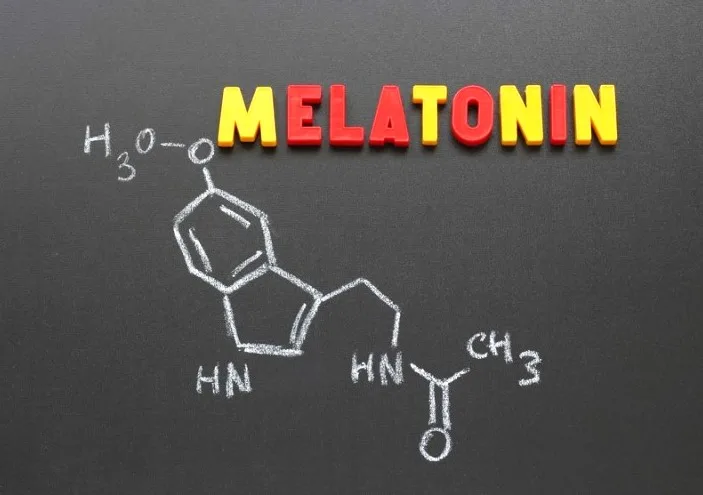Melatonin – Anti-Aging Miracle Revealed
Scientists and researchers are investigating a number of approaches to discover the mysteries of aging reversal in their pursuit of eternal youth. Melatonin has shown itself to be a promising contender among them. This hormone, which is found naturally in the body, is essential for both sound sleep and preventing the skin from aging too quickly. Let’s explore the amazing realm of melatonin and how it manages to withstand the passage of time.

The Anti-Aging Marvel
Melatonin, commonly known as the sleep hormone, has gained recognition for its protective role against premature skin aging. Exposure to environmental factors such as stress, solar radiation, poor nutrition, and air pollution can wreak havoc on our skin. However, melatonin steps in as a guardian, preventing mitochondrial and DNA damage, oxidative stress, and inflammation.
Unveiling Melatonin’s Superpowers
The antioxidant effects of melatonin are nothing short of miraculous. By alleviating oxidative stress, melatonin safeguards cells from harm, actively working against the aging process. Its regulatory influence extends to inflammation, mitochondrial function, and the immune system, all of which are crucial players in the aging game.

Combatting UV-Induced Damage
Melatonin emerges as a powerful ally in the battle against UV-induced solar damage. It counteracts the massive generation of reactive oxygen species, mitochondrial and DNA damage, offering substantial evidence of its effectiveness as an anti-skin aging compound.
Boosting Collagen Synthesis
The activation of procollagen type III expression is a key marker of the early step in collagen synthesis, and melatonin doesn’t disappoint. Studies show that melatonin treatment increases collagen synthesis, without promoting collagen catabolism, dependent on MMP-2.
Melatonin vs. Vitamin E
Melatonin takes the spotlight as a superior antioxidant compared to vitamin E, a widely acclaimed lipophilic antioxidant. Its potency in protecting cells from oxidative stress sets it apart as a potent weapon in the fight against aging.
Melatonin and Hair Health
Beyond skin benefits, melatonin has shown remarkable results in promoting scalp hair growth, density, and hair shaft thickness. Users consistently report improvements, positioning melatonin as a valuable ally in the pursuit of healthy and luscious locks.
Melatonin and Sleep Quality
Higher melatonin production not only aids in the battle against aging but also contributes to better sleep quality. Explore six practical ways to naturally boost melatonin production, ensuring a restful night’s sleep.
Get sunlight.
Sleep in a completely dark room.
Cut back on caffeine.
Reduce screen time at night.
Manage your stress.
Eat magnesium-rich foods.
Dietary Sources of Melatonin
While melatonin is naturally produced in the body, incorporating certain foods into your diet can further enhance its levels. Fish, particularly oily varieties like salmon and sardines, are excellent sources of melatonin, providing additional benefits with omega-3 fatty acids. Nuts, such as pistachios and almonds, are rich in melatonin, while pineapples and cherries have been found to double melatonin levels.
Melatonin, often underestimated, emerges as a powerhouse in the realms of anti-aging and sleep enhancement. From protecting the skin against environmental aggressors to promoting collagen synthesis, melatonin proves its mettle. Incorporating melatonin-rich foods into your diet and adopting habits that boost its production can pave the way for a more youthful appearance and restful nights. Embrace the power of melatonin – your ally in the fight against aging and sleep woes.
References:
Agabiti-Rosei C., Favero G., De Ciuceis C., Rossini C., Porteri E., Rodella L. F., et al.. (2017). Effect of long-term treatment with melatonin on vascular markers of oxidative stress/inflammation and on the anticontractile activity of perivascular fat in aging mice. Hypertens Res. 40, 41–50. 10.1038/hr.2016.103 [PubMed] [CrossRef] [Google Scholar]
Akyildiz A. G., Biondi-Zoccai G., De Biase D. (2022). Impact of the gastrointestinal tract microbiota on cardiovascular health and pathophysiology. J. Cardiovasc. Pharmacol. 10.1097/FJC.0000000000001273 [PubMed] [CrossRef] [Google Scholar]
Alexopoulos N., Raggi P. (2009). Calcification in atherosclerosis. Nat. Rev. Cardiol. 6, 681–688. 10.1038/nrcardio.2009.165 [PubMed] [CrossRef] [Google Scholar]
Anderson G., Maes M. (2020). Gut dysbiosis dysregulates central and systemic homeostasis via suboptimal mitochondrial function: assessment, treatment and classification implications. Curr. Top. Med. Chem. 20, 524–539. 10.2174/1568026620666200131094445 [PubMed] [CrossRef] [Google Scholar]
Anderson G., Mazzoccoli G. (2019). Left ventricular hypertrophy: roles of mitochondria cyp1b1 and melatonergic pathways in co-ordinating wider pathophysiology. Int. J. Mol. Sci. 20:4068. 10.3390/ijms20164068 [PMC free article] [PubMed] [CrossRef] [Google Scholar]

2 thoughts on “Melatonin: The Secret Weapon Against Aging and Sleep Woes”